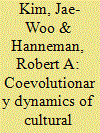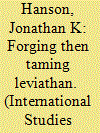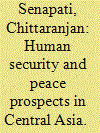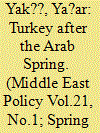|
|
|
Sort Order |
|
|
|
Items / Page
|
|
|
|
|
|
|
| Srl | Item |
| 1 |
ID:
128977


|
|
|
|
|
| Publication |
2014.
|
| Summary/Abstract |
The emergence and institutionalization of cooperation in sizable groups without reciprocity receives considerable attention in game-theoretical modeling. Agents in our study play the Prisoner's Dilemma game cooperating with tolerably similar neighbors. They may imitate cultural markers (tags) and tolerance from more successful neighbors. Alternatively, they break ties to out-group neighbors. New partners are selected either from neighbors' neighbors (clustering) or randomly. Variations in network plasticity (the likelihood of changing partners rather than being influenced) and clustering are explored. With high plasticity and high clustering, networks tend to fragment. With low plasticity and low clustering, networks tend toward global cooperation, but with severe losses of cultural diversity and tolerance. Cooperation in such regimes also proves to be vulnerable to defection. Between, there is a space displaying relatively stable and widespread cooperation with diversity and tolerance. We note some important structural characteristics of the networks evolving in this space.
|
|
|
|
|
|
|
|
|
|
|
|
|
|
|
|
| 2 |
ID:
126620


|
|
|
|
|
| Publication |
2013.
|
| Summary/Abstract |
Maritime territorial disputes have become a hot issue in regional security and a pressing issue for Taiwan's national security. While Taiwan is persistently claiming sovereign right over the large part of the South China Sea based on the U-shaped line, its role is however weakened as a result of the cross-strait hostility and its prolonged hands-off policy. Of course, its ambiguous international status, difficult relation with mainland China and domestic political confusion on nation's future have more to do with its inactive role in the South China Sea disputes. This insecurity contributes to its ambivalent policy. This articleintends to address Taiwan's legitimate claim for the part of the South China Sea, which has been unknown and neglected by the international community, and examine the reasons why Taiwan had taken inactive policy toward the South China Sea. Alerted by recent aggressive moves of other claimants, Taiwan is now shifting to a reasonable tougher strategy in the South China Sea. The articlealso projects the course of fresh efforts made by the Taiwan government pressurised by the public with increasing awareness of urgency.
|
|
|
|
|
|
|
|
|
|
|
|
|
|
|
|
| 3 |
ID:
186802


|
|
|
|
|
| Summary/Abstract |
Beginning in the late 1970s in China, Deng Xiaoping shifted the Chinese Communist Party (CCP) line from revolution to reform, confining economic reform within the principles of socialism and communist party rule, with the political logic for party rule meant to prevail over the economic logic for economic development. However, as the reform proceeded, the CCP was led to concede to the economic logic. Even though the CCP set the building of a socialist market economy (SME) as the goal of economic reform, the actual reform path traversed not only marketization but also more importantly privatization. Throughout the shareholding reform of state-owned enterprises (SOEs), conversion of state-owned commercial banks (SOCBs) into stock companies, and the mixed ownership reform (MORs) of SOEs, the CCP had to accept the expansion of privatization for reasons of economic performance, despite the subsequent increase in ideological and political difficulties such would entail for regime identity and party rule, thus generating a political dilemma for the CCP.
|
|
|
|
|
|
|
|
|
|
|
|
|
|
|
|
| 4 |
ID:
133653


|
|
|
|
|
| Publication |
2014.
|
| Summary/Abstract |
Empirical research in the New Institutional Economics tradition has concentrated on the degree to which institutional constraints on rulers protect property rights and foster growth through private investment. This view of institutions is overly narrow, neglecting the role of state capacity in particular. Both state authority and constraints on rulers matter for economic performance, but the relative strength of these effects depends upon a country's distance from the frontier of the world economy. Tests using a panel data set that covers up to 84 countries from the period 1960 to 2005 reveal that, in countries that have low Gross Domestic Product (GDP) per capita, constraints on rulers in the form of checks and balances affect neither the rate of productivity growth nor the growth of capital stock per worker. Basic state authority, however, has a strong, positive effect on both of these outcomes. The story is different for advanced industrial economies, where the effects of checks are positive, especially with respect to productivity growth. Institutional checks on rulers are thus not an agent of investment-based growth but support continued growth based upon innovation at the leading edge.
|
|
|
|
|
|
|
|
|
|
|
|
|
|
|
|
| 5 |
ID:
129066


|
|
|
|
|
| Publication |
2014.
|
| Summary/Abstract |
Central Asia has always been a blend of cultures due to its massive migrations and the mixing of peoples coming from outside. In this context this mixture of people in many ways reflected both the best and the worst that each group had to offer. ln the "Great Game" of the Nineteenth century influ-ences from the North and the South played a part in shaping the region'. This unique blend of peoples and cultures are not seen elsewhere in the world (Table 1). To manage this blend of people will always be difficult. So most of the time this bland poses the issues of conflict and insecurity. Be that it is, human security can be an approach to provide security to Central Asian countries. However, in early 1990s, the fall of Berlin Wall (1989), demise of the soviet communism and ascendancy of the neoliberal global regime, altered the international power structure from bipolar to multi-polar world order and this has resulted into the emergence of new security concerns like global terrorism, environmental issues, energy security, food security etc. In the new complicated situation the Central Asian Republics (CARS) have been goaded to rethink the very notion of security from different perspectives.
|
|
|
|
|
|
|
|
|
|
|
|
|
|
|
|
| 6 |
ID:
131762


|
|
|
|
|
| Publication |
2014.
|
| Summary/Abstract |
This article revisits the security dilemma theory and its application to civil conflict. Based on a careful reading of existing studies, it exposes the deviations from the original theory developed in the 1950s and more recent amendments, which have substantially reduced the explanatory value of the theory. The article shows that when the original and the amended versions of the theory are applied to civil conflict, neither can explain the outbreak of armed conflict. While anarchy might be present as a precondition for the dilemma to operate, a previous history of violent interaction often leaves little room for misperception of intentions. Absent uncertainty about malign intentions toward the other group, the security dilemma theory loses relevance to explain the outbreak of civil conflict.
|
|
|
|
|
|
|
|
|
|
|
|
|
|
|
|
| 7 |
ID:
129101


|
|
|
|
|
| Publication |
2014.
|
| Summary/Abstract |
The recent land use policy ol' "landing the l')eere;tse in Rural ('onxtrttelion Land with the Increase in L.'rh:tn ("onxtruetion l.and" i.\ an attempt of the government to address the tensions between protecting arable land and providing land lior construction by means of more intensive use of land. Nevertheless. the implementation ol" the policy has triggered notch controversy. in particular about predominant dependence upon retrial residential land totes consolidation and the pursuits of rural~ urban construction land quota transfer. Although local governments often take the blame for these issues. the case study of the comprehensive land consolidation project in Gull reveals the type of dilemma with which they are confronted. [t is shown that the potential for land consolidation is limited. whereby local governments have to turn to rural residential land consolidation to achieve the targets set by the central government for land consolidation. Furthennorc. the displacement and resettlement of rural dwellers puts tremendous financial pressure upon the local government. and it would be impossible to implement the central government mandate to build a new socialist countryside without selling land at a higher price. This article discusses the possibilities for a market-led land consolidation process and concludes that the targets of land consolidation and the implementation of the linking policy should \-'ar_v from region to region to match local levels of economic development and specifieities of the rural economy.
|
|
|
|
|
|
|
|
|
|
|
|
|
|
|
|
| 8 |
ID:
130937


|
|
|
|
|
| Publication |
2014.
|
| Summary/Abstract |
Turkey's attitude regarding developments in the countries affected by the "Arab Spring" varied according to the approach of the ruling Justice and Development Party (Adalet ve Kalk?nma Partisi, AKP) and its perceptions of the countries in question.
In Tunisia, Annahda, a political party that originated from the Muslim Brotherhood (MB) tradition, emerged as the strongest political movement after the fall of the Ben Ali regime. Annahda has an ideological affinity with the AKP, which also has Islamist roots. There is, in addition, a deep-rooted tradition in Tunisia to regard Turkey as a source of inspiration for various reforms. Turkey was, at the beginning of the Arab Spring, referred to by some as a role model. This concept did not acquire much content as time went by, however.
In Libya, Turkey hesitated at the beginning to get involved in the crisis and even wanted to keep NATO out of it.1 Seeing, however, that "a coalition of the willing" was going to intervene with or without Turkey, it made a swift change and participated in the operations with six aircraft and five ships.
When the mainly Shia population of Bahrain wanted to follow the example of the other Arab Spring countries and protest against its Sunni ruler, Saudi Arabia formed a Gulf Cooperation Council (GCC) intervention force, composed mainly of Saudis, and repressed the demonstrations with a ruthlessness comparable to the methods used by the ousted regimes in the other Arab countries. The international community adopted a double standard and kept silent; Turkey went along with this consensus.
Turkey's reaction to the events in Yemen was restrained; it was viewed as a distant country and of low priority on the international agenda. The fact that Saudi Arabia stepped in as the main actor may also have played a role in Turkey's lack of enthusiasm for getting involved more deeply.
|
|
|
|
|
|
|
|
|
|
|
|
|
|
|
|
|
|
|
|
|